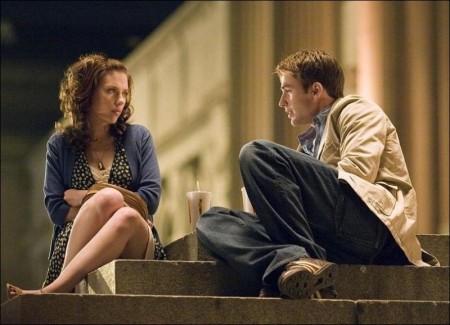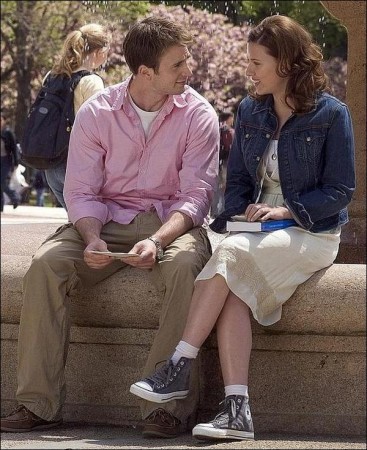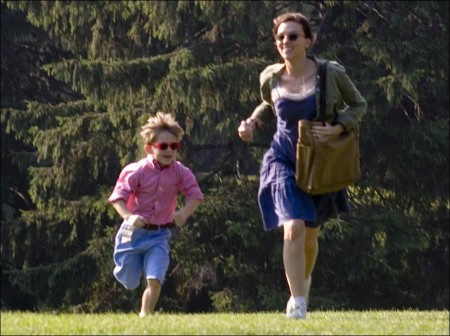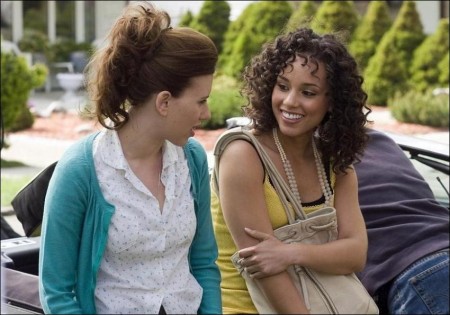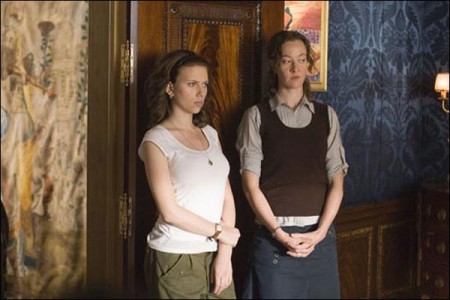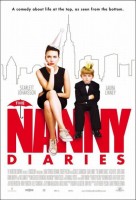Tagline: A comedy about life at the top, as seen from the bottom.
“The Nanny Diaries” tells the story of the emotional and often humorous journey of Annie Braddock (Johansson), a young woman from a working-class neighborhood in New Jersey, struggling to understand her place in the world. Fresh out of college, she gets tremendous pressure from her mother to find a respectable position in the business world although Annie would prefer to trade in her blackberry for an anthropologist’s field diary.
Through a serendipitous meeting, Annie ends up in the elite and ritualistic culture of Manhattan’s Upper East Side – as remote from Annie’s suburban New Jersey upbringing as life in an Amazon tribal village. Choosing to duck out of real life, Annie accepts the position as a nanny for a wealthy family, referred to as simply “the X’s.”
She quickly learns that life is not very rosy on the other side of the tax bracket, as she must cater to the every whim of Mrs. X (Linney) and her precocious son Grayer, while attempting to avoid the formidable Mr. X (Giamatti). Life becomes even more complicated when Annie falls for a gorgeous Park Avenue Hottie (Evans), and she’s forced to re-examine her life and the direction in which it is headed.
About the Production
In 2002, the satirical novel “The Nanny Diaries” was published to critical acclaim, blockbuster sales, and a substantial degree of notoriety. The book’s controversy was inspired by the fact that its authors, Emma McLaughlin and Nicola Kraus, had spent a combined eight years working as babysitters in Manhattan, for over thirty families.
As their novel presented a scathing and hilarious portrayal of an astronomically affluent Park Avenue family, the media began whispering, “who’s-the-book-really-about?” While the authors insisted their book was fiction, it was written in such a knowing style that it practically invited this kind of speculation.
Months before the hoopla, the book’s film rights were purchased by Producer Richard N. Gladstein (Finding Neverland, The Cider House Rules) and his associate Gary Binkow, for Miramax. “It was just as good an idea when we first read it,” says Gladstein, “but it obviously puts a different responsibility on us as filmmakers once so many people have read the book—we have to get it right. But our intention all along was to make our own film.”
Gladstein had become friendly with screenwriter/directors Shari Springer Berman and Robert Pulcini when he met with them about a screenplay they had previously written. After seeing an advance screening of their acclaimed film, American Splendor, he approached them about writing the screenplay for The Nanny Diaries, and subsequently, to direct as well.
At first glance, it might seem surprising that Springer Berman and Pulcini would follow their portrayal of the humdrum life of Cleveland file clerk Harvey Pekar in American Splendor by exploring the high-flying upper crust of The Nanny Diaries. “We really liked that the setting was so drastically different,” says Pulcini. “It was very appealing to jump into a completely different world.”
“I’m a native New Yorker,” says Springer Berman, “and I could tell that the women who wrote the book were real New Yorkers—it wasn’t a fantasy from someone who lives someplace else. It was truthful, and a very interesting portrait of a subculture that I found fascinating.”
The novel also connected to a theme that the directors have been fascinated with throughout their career. “The book is about work,” says Springer Berman. “Harvey Pekar spends a lot of time talking about his boring job, and even our documentaries, like The Last Days of Chasen’s,” are about work environments. A nanny is a job that is often invisible; I felt we could tap into that.”
Springer Berman herself went through a period of her life very similar to the heroine of The Nanny Diaries. “Right after I graduated from college, I got a job working for a husband and wife screenwriting / producing team,” she says. “I worked out of their home and got totally entrenched in their lives. I wasn’t a nanny, but it was a very nanny-like situation. For me, it was a point in my life to duck out and not have to make any decisions. When I read the book, it appealed to me to write a script about a phase—which I think most young people go through— where they don’t know who they are yet.”
In keeping with Springer Berman’s personal connection to the story, the filmmakers made the main character, Annie Braddock, a recent graduate, rather than still a student, as in the book. A big challenge Springer Berman and Pulcini faced in translating the novel into a film was that much of the story was told through Annie’s inner thoughts. The filmmakers use some narration, but they also devised more cinematic strategies. As Annie is an observer at this point in her life, they made this more explicit by turning her into anthropology major. When Annie looks at various characters in the film—generally career women—she fantasizes seeing them in diorama cases in the Museum of Natural History.
“She steps outside herself,” says Pulcini, “and she becomes a hundred percent observer.” In the book, many of the characters — usually the moneyed ones—were given generic names like Mr. and Mrs. X, Harvard Hottie, etc. While this may have been because the authors wanted to keep their real subjects anonymous, Springer Berman and Pulcini retained them in the movie, which fit in well with Annie’s anthropological perspective. On the other hand, they changed the name of the main character—whose real name is “Nanny” in the book—to “Annie.” “We wanted her to lose her name and her identity when she went to work with the X’s,” says Springer Berman.
Springer Berman and Pulcini also tipped their hats to the most iconic nanny movie ever, “Mary Poppins,” with fantasy sequences of Annie grasping a bright red umbrella and floating over the Manhattan skyline. “We wanted to capture the whimsical feeling of “Mary Poppins” and “The Sound of Music,” but also to juxtapose that a little bit with the reality of New York,” says Pulcini. “We loved the idea of using the red umbrella as a symbol of her desire for freedom and escape from her life and her problems.”
Casting
Springer Berman and Pulcini turned to one of America’s leading young actresses, Scarlett Johansson, to play Annie. “Scarlett has been great at playing a glamorous role, or a vixen, but prior to Scoop, I don’t think movies have taken advantage of her comic ability,” says Springer Berman. “People underestimate how terrific she is at playing an ordinary person with insecurities. She’s also very good at physical comedy—her pratfalls were amazing.” “Scarlett has great wit, great timing, and is also a great dramatic actress,” say Pulcini.
Annie’s not quite like anybody I’ve ever played,” says Johansson. “Even though she’s sort of lost—and I’ve done characters like that before—she’s quite confident in herself as a woman. I think that’s the difference between her and someone like Charlotte in Lost in Translation. There’s also a youthfulness to her that’s different from my other characters.”
Two-time Oscar nominee Laura Linney (The Squid and the Whale, Kinsey, You Can Count on Me) joined the cast as the spoiled socialite Mrs. X. “It was great to cast Laura in a role where she can be really glamorous,” says Springer Berman. “I think she has this person in her, but I don’t think she’s played that role a lot.” “Laura is a great actress but she wasn’t an obvious choice,” says Pulcini. “People associate her with more earthy roles, but she actually grew up on the East Side.” “I didn’t grow up inside the world of Mrs. X, but I certainly saw a lot of it,” says Linney. “I went to a school where many of the girls were daughters of Mrs. X-types. I’m more aware of this lifestyle now than when I was younger, but I certainly saw glimpses of it then.”
Another casting choice that might seem offbeat is American Splendor’s Paul Giamatti as Mr. X. “People assume because of the roles Paul plays in movies that he is an uneducated working class guy,” says Springer Berman, “but in fact, he’s the son of A. Bartlett Giamatti, who was the President of Yale and the Commissioner of Baseball. Paul went to a boarding school, and has multiple degrees from Yale. He’s moved in those circles all his life, and he’s also a fantastic actor—in my opinion, the greatest actor there is. One of the things Bob and I like to do is cast people in roles we haven’t seen them in. It was also interesting to cast Paul as an unsympathetic character, because he’s so well-known for being sympathetic—and see what he can do.”
“I actually like playing the bad guy,” says Giamatti. “It’s fun. I pop in every now and then and bark at somebody or do something creepy. Mr. X is so excessively unpleasant and awful, and a lot of time is spent never looking at his face, so there’s this great anticipation of what’s he’s going to look like—and then he looks like me! He’s not of Aryan guy you think he’s going to be.
Giamatti has known Laura Linney socially for a long time, but has never really acted with her (although they both were in The Truman Show) before The Nanny Diaries. “She’s one of those people that make you a hell of a lot better just being around them,” says Giamatti. “She’s definitely one of the best actresses around. And she’s also very funny.”
A pivotal part of the story of The Nanny Diaries is how Annie falls in love with her charge, Grayer X, played by 7-year-old Nicholas Reese Art. In order for the story to work, the audience would have to feel their bond, how it would be impossible for Annie to leave him, despite the oppressiveness of her job. “When Scarlett read with Nick, we wanted to be absolutely sure that they had chemistry,” says Pulcini.
“When I first met with Nick,” says Johansson, “I recognized something in him and I felt a kinship to him immediately. He’s a regular kid, but when it comes time to film he’s amazingly focused.” “The truth is, while we were making the movie, Scarlett and Nick fell in love, and those two were inseparable,” says Springer Berman. “It was unbelievable how much they connected.” The filmmakers were very impressed with the young actor’s professionalism. “When Nick is working he doesn’t fidget, he listens when you give him direction and really wants to know how he is supposed to feel in a scene,” says Pulcini, “but as soon as we stop rolling, he’s a kid again.”
The filmmakers turned to Broadway leading light Donna Murphy to play the Annie’s mother Judy, a woman with high aspirations for her daughter. “Judy is pushing Annie to go into finance, which Annie knows in her heart isn’t right for her. But she doesn’t have the heart to tell her.
“Judy is a very special role in the film because she’s really the catalyst for everything Annie does in the course of the film,” says Pulcini. “So the person who played Judy had to be very strong, but she also had to be very sympathetic — there had to be a double play of strength and guilt going on.”
“Judy put herself through nursing school, and worked overtime so that her daughter could have opportunities that she never had a chance to have for herself,” says Murphy. “She wants Annie to have a career that will guarantee her financial security, but that’s not necessarily what Annie wants, and they end up somewhat at odds.”
Grammy-winning, multi-platinum recording artist Alicia Keys joined the cast as Lynette, Annie’s feisty best friend. “Lynette is crazy and spunky—I call her noisy,” says Keys. “She’s loud and her colors—she wears a lot of accessories and jewelry—are loud. When she’s in the room, you know she’s in the room. She might not exactly fit into what the majority is doing, but she’s fun.”
While Springer Berman always had an instinct that she wanted Keys to play the role, neither of the directors knew if she could act. In fact, Keys, whose mother is an actress, began acting in theatre as a child (and even made an appearance on “The Cosby Show”). “I’ve always loved acting,” says Keys, “but as I got older I realized how much my passion for music was so prevalent–so that’s the direction I went into. But I’ve always loved the way you can watch a movie, or go to the theatre, and be totally enraptured in people that don’t even exist. There lives become your pain, your pleasure, your happiness. And that’s the same thing that music does for me. I feel that acting and music are brothers and sisters.”
“Alicia is a real spitfire girl,” says Johansson, “and everybody’s always in such good spirits when she’s around. She’s a great actor and she’s certainly a better improvisational actor than I’ll ever be.”
Springer Berman and Pulcini saw over a hundred actors for the role of Harvard Hottie, the handsome preppie who tries to romance Annie. “We wanted the man who would just make Scarlett’s heart melt,” says Springer Berman. “Chris Evans came in and blew us away. He gave a fantastic audition and looked incredible. I think he’s the next Robert Redford.”
“Harvard Hottie meets Annie and they have a nice little interaction,” says Evans. “But when they bump into each other at a bar a couple of weeks later, his buddies make a fool out of themselves, and he wants to show her that he’s not one of those Upper East Side jerks. She rejects him the first couple of times, but he persists until he gets her to go out with him.”
“In Annie’s mind, he’s out of her class,” says Springer Berman, “and he is out of her class. In Harvard Hottie’s mind it isn’t an obstacle, but then again, he comes from the upper-class, so he’s got nothing to lose.” “Annie also understands that part of her job description is no life allowed,” says Pulcini. “She knows that if she’s even seen in the building with this guy, it means the loss of her job.”
“I think Harvard Hottie understands Grayer’s situation, which pretty much mirrors his own” says Evans. “It’s the type of lifestyle where you have to mature early, and you can adopt some pretty nasty tendencies along the way. So that’s why Scarlett’s character feels the need to make sure the kid doesn’t end up like his father.”
The cast relished the experience of working with a directing team. “I’m amazed at how harmonious their relationship is,” says Johansson. “I’m not sure exactly how they divvy things up,” says Giamatti. “They just sort of feather into each other,” says Linney.
“One might give an emotional direction and one might give a physical direction. They seem to cover each other really well, and you feel like you’ve gotten the full spectrum, sort of the feminine and masculine analysis of the character,” says Johansson. “They’re good actors’ directors because I find them extremely simple about what they tell you to do. They’re aware of how to talk to each actor the way they need to be talked to,” says Giamatti. “I think it’s a credit to their marriage that they’re able to communicate so well and compliment each other so beautifully,” says Linney.
The Look of the Film
It was important for the production team that The Nanny Diaries be filmed entirely in New York, and, as much as possible, on location. “We worked very hard to find great locations all over Manhattan,” says executive producer Dany Wolf. “We were lucky enough to film at the Museum of Natural History, the Metropolitan Museum, Central Park, Bergdorf Goodman, among others. New York’s embraced our production with open arms.” “I think Shari and Bob are trying to make this film a real love letter to New York with all its eccentricities, wonderful locations, and amusing people,” says Linney. “There’s no place like New York.” “The notion of creating New York City, would be crazy,” says Gladstein.
Working with cinematographer Terry Stacey (who previously teamed with them on American Splendor), Springer Berman and Pulcini sought to photograph New York with a heightened sense of reality, like an urban fairy tale. “We were thinking about something a bit along the lines of a contemporary Breakfast at Tiffany’s,” says Springer Berman. “That’s the references we started with, and then Terry was the one who made it happen.”
Not all the grandeur of New York City was found outside. “We scouted some pretty incredible apartments,” says Pulcini. “You don’t realize what’s behind some of the doors in Manhattan. I remember we saw one apartment that was so big that I lost all the people we were scouting with—just wandering around.” “It gives you a really different perspective on your life and the place that you live,” says Springer Berman.
Most of the film’s interiors were shot on real locations all over New York, but production designer Mark Ricker created the X’s immense and opulent apartment at Steiner Studios in Brooklyn. Ricker emphasized the formality of the place by playing with symmetry. “It’s hard to look anywhere in the apartment without finding pairs of everything,” says Ricker. “There are pairs of mirrors, pairs of lamps, pairs of doors—there’s no place for anything to be out of place. If it is, you’d know right away, because the other thing is still where it was.”
Costume Designer Michael Wilkinson previously teamed with Springer Berman and Pulcini on American Splendor, where the attire tended to be on the grungy side. “We were really excited to present him with a film where he could really go to town,” says Pulcini. And boy did he!” Among other things, Wilkinson created a host of outfits for various high and low society characters, as well as Namibians, Samoans, Pierrot clowns, and a Betsy Ross costume for Scarlett. “Everything you could possibly imagine is represented in the wardrobe of this movie,” says Pulcini.
With the costumes for Annie and Mrs. X, Wilkinson, Springer Berman and Pulcini collaborated closely with the actors. “I think everything that Scarlett wore in the move—except the gray business suit, which she hated, but Annie hated as well—was something Scarlett would have worn in real life,” says Springer Berman. “We wanted Annie to be someone who had her own idiosyncratic style that was a little bit funky and unique to her. We wanted her to be as far as possible from Mrs. X who could buy the big designer outfit of the moment. Annie couldn’t afford to do that, but she could walk into a thrift shop and find an old dress for under a hundred dollars and look like she’s wearing some designer outfit.”
Mrs. X’s luxurious couture wasn’t seen only as an expression of her privileged world. “One of the things we talked about with Michael and Laura is there’s an element of insecurity with Mrs. X,” says Pulcini. “She’s from money, but she’s probably not from the kind of money that Mr. X and his family are from—so she overcompensates a little bit for that. We talked about her being the kind of person that’s always trying on a look and maybe going one step too far with it. She’s always trying to present some image of herself that may not necessarily be her.” “Laura’s character is like a peacock,” says Wilkinson. “She wants the other ladies to comment on how fabulous she looks. I said to Shari and Bob that when she comes into a room she should feel like a bouquet of flowers in the room. So we used lots of floral colors.”
* * *
“I think the movie has a lot to say about narcissism,” says Linney, “The thing about Mrs. X being so absent and yet so controlling is that in her mind she’s doing absolutely everything right. She’s basically terrified of her own child. She wants to love him but she really doesn’t know how.”
“A lot of people need nannies because they work,” says Pulcini. “It’s a rich topic and it’s a dilemma. Kids are always going to fall in love with someone they spend so much time with. And how do you balance that? This seems to hit a nerve with people, and maybe that’s why the book was such a phenomenon.”
“Grayer’s mother is not very happy, his father’s always gone, they make a lot of money, but there’s no unity, no family,” says Keys. “There’s always another nanny, another person to take him wherever he has to go. There are people that do grow up like that, and are just kind of shuffled from person to person and don’t have that base where they feel protected and loved.”
“I think the message of the movie is that it’s really important to take the time to know your child,” says Murphy. “And it’s true for my character as it is for Laura’s character. You need to nurture and love your child in the particular way that that child needs.”
“The Nanny Diaries is an exploration of the options of a woman in contemporary society,” says Springer Berman. “What kind of woman can you be? There’s motherhood, there’s career, there’s all sorts of examples of what it’s like to be a woman presented in this movie, and Annie is this young woman on the verge of her life, and she’s thrown into all these different circumstances and ultimately comes up with who she is. I hope that it shows one woman’s exploration into who she’s going to be as a woman, and finding herself.”
“The Nanny Diaries is about the pressure we put on our kids to have a passion and to succeed, and be adults when we’re still kids,” says Johansson. “You’re pushed out of the house and it’s like ‘Okay, what now?’ I think it’s very insightful about the kind of the crisis that young people go through in their twenties.”
“There’s a fairy tale quality to The Nanny Diaries,” says Giamatti. “Laura is a kind of evil stepmother as opposed to Donna, who is Scarlett’s good mother; I am a Big Bad Wolf type of guy, and Scarlett is a little like Cinderella. I think it has a fairy tale quality of someone becoming a better person after a lot of trials and tribulations. But hopefully, it’ll be a funny movie too.”
Music
The Nanny Diaries boasts an eclectic assortment of music from such diverse countries as Mali, Peru, Madagascar and France and includes original score inspired by these international sounds. “Being that Annie frames her whole nanny experience as an anthropological field diary, we decided to utilize world music throughout the film. It is a musical metaphor for our main character’s journey as an outside observer in a strange culture.” said Springer Berman.
Working with long time collaborator, composer Mark Suozzo (American Splendor), the filmmakers fashioned a score that blends influences from artists including Ali Farka Toure, Serge Gainsbourg, George Michael and Les Baxter. “We wanted the music in the film to reflect Annie’s perspective at this, pivotal moment in her life,” says Pulcini.
Production notes provided by MGM, The Weinstein Company.
The Nanny Diaries
Starring: Scarlett Johansson, Laura Linney, Paul Giamatti, Donna Murphy, Alicia Keys, Chris Evans, Judith Roberts, Nicholas Reese Art, Julie White
Directed by: Shari Springer Berman
Screenplay by: Robert Pulcini
Release Date: September 7, 2007
MPAA Rating: PG-13 for language.
Studio: MGM, The Weinstein Company
Box Office Totals
Domestic: $25,930,652 (56.4%)
Foreign: $20,050,023 43.6%)
Total: $45,980,675 (Worldwide)
